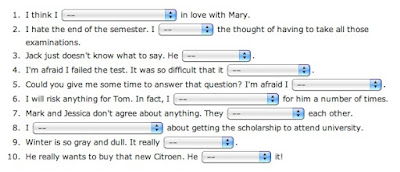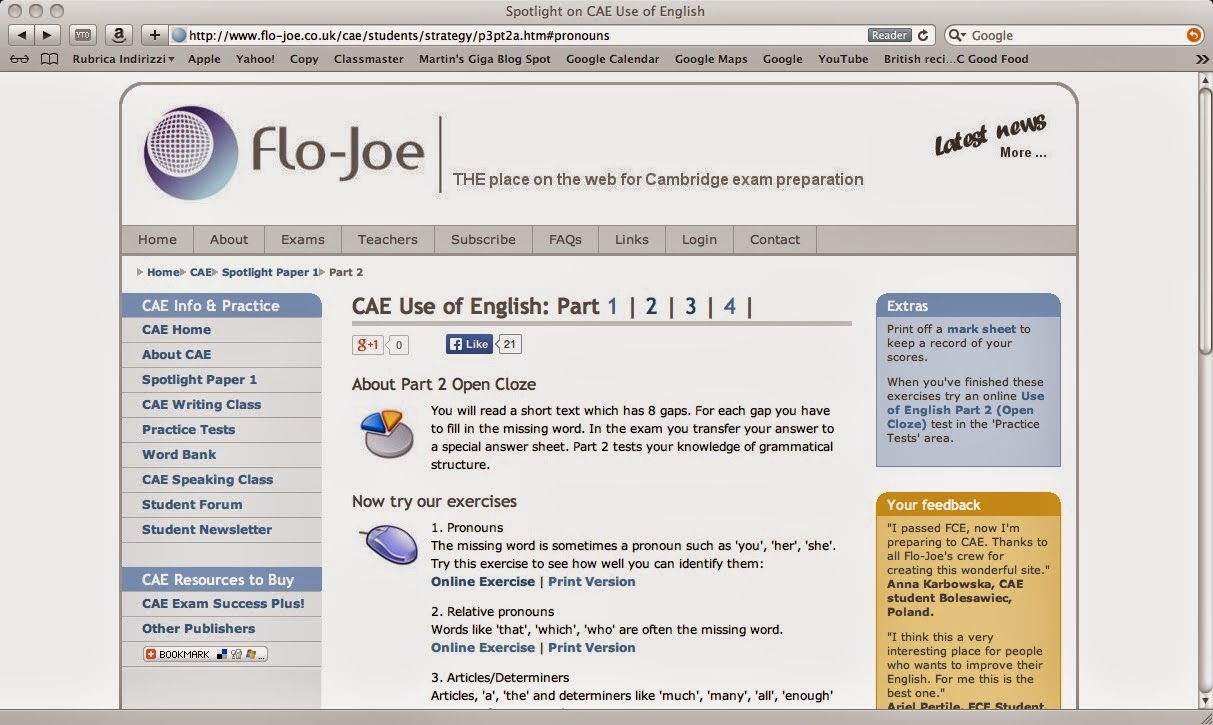Idioms
Idioms are an essential part of Advanced English language.
Learn a handful of new idioms from this online exercise and then try applying them to your productive skills when you do your writing and speaking practice.
Go to the link below to begin.
http://esl.about.com/library/vocabulary/blthink2.htm?once=true&
CAE Page
Follow your lessons and homework here
Friday, 30 September 2016
Wednesday, 11 March 2015
Use of English Part 2
Practise your skills at Use of English using the Flo-Joe website link below.
http://www.flo-joe.co.uk/cae/students/strategy/p3pt2a.htm#pronouns
Try Part 2 by clicking the link below.
You can get hints and check your answers using the buttons below the exercise.
Click here to try Use of English Part 2
Practise your skills at Use of English using the Flo-Joe website link below.
http://www.flo-joe.co.uk/cae/students/strategy/p3pt2a.htm#pronouns
Try Part 2 by clicking the link below.
You can get hints and check your answers using the buttons below the exercise.
Click here to try Use of English Part 2
Friday, 6 March 2015
Monday, 2 March 2015
Listening Practice - Part 1
Listening to conversations in three different audio extracts (multiple choice)
Go to the link below to practise this Part 1 multiple choice test from the English Exam website
http://www.examenglish.com/CAE/cae_listening1.htm
Listening to conversations in three different audio extracts (multiple choice)
Go to the link below to practise this Part 1 multiple choice test from the English Exam website
http://www.examenglish.com/CAE/cae_listening1.htm
Monday, 23 February 2015
Speaking Practice - Advanced full Speaking Test (Parts 1-4)
Watch the YouTube video clip of this new Advanced 2015 Speaking test and then go to the Cambridge English pdf link to see how the candidates did in the various areas of assessment.
click here to go to the YouTube link
Click here to go to Cambridge English Test Assessment pdf
Wednesday, 4 February 2015
Reading Practice (Parts 1 and 2)
Try your hand at these two reading practice online exercises offered by Examenglish.com
Go to the links below to access the website and follow the instructions.
Time yourselves - give yourselves just five minutes for each exercise.
http://www.examenglish.com/CAE/cae_reading1.htm
http://www.examenglish.com/CAE/cae_reading2.htm
Try your hand at these two reading practice online exercises offered by Examenglish.com
Go to the links below to access the website and follow the instructions.
Time yourselves - give yourselves just five minutes for each exercise.
http://www.examenglish.com/CAE/cae_reading1.htm
http://www.examenglish.com/CAE/cae_reading2.htm
Friday, 23 January 2015
Sentence Structure
A simple sentence has only one clause:
John wanted a new bicycle.
All the girls are learning English.
All the girls are learning English.
Compound sentences:
A compound sentence has two or more clauses:
(We stayed behind) and (finished the job)
(We stayed behind) and (finished the job), then (we went home)
(We stayed behind) and (finished the job), then (we went home)
The clauses in a compound sentence are joined by co-ordinating conjunctions:
John shouted and everybody waved.
We looked everywhere but we couldn’t find him.
They are coming by car so they should be here soon.
We looked everywhere but we couldn’t find him.
They are coming by car so they should be here soon.
The common coordinating conjunctions are:
and – but – or – nor – so – then – yet
Complex sentences:
A complex sentence has a main clause and one or more adverbial clauses. Adverbial clauses usually come after the main clause:
Her father died when she was very young
>>>
Her father died (main clause)
when (subordinating conjunction)
she was very young (adverbial clause)
>>>
Her father died (main clause)
when (subordinating conjunction)
she was very young (adverbial clause)
She had a difficult childhood because her father died when she was very young.
>>>
She had a difficult childhood (main clause)
because (subordinating conjunction)
her father died (adverbial clause)
when (subordinating conjunction)
she was very young (adverbial clause).
>>>
She had a difficult childhood (main clause)
because (subordinating conjunction)
her father died (adverbial clause)
when (subordinating conjunction)
she was very young (adverbial clause).
Some subordinate clauses can come in front of the main clause:
Although a few snakes are dangerous most of them are quite harmless
>>>
Although (subordinating conjunction)
some snakes are dangerous (adverbial clause)
most of them are harmless (main clause).
>>>
Although (subordinating conjunction)
some snakes are dangerous (adverbial clause)
most of them are harmless (main clause).
A sentence can contain both subordinate and coordinate clauses:
Although she has always lived in France, she speaks fluent English because her mother was American and her father was Nigerian
>>>
Although (subordinating conjunction)
she has always lived in France (adverbial clause),
she speaks fluent English (main clause)
because (subordinating conjunction)
her mother was American (adverbial clause)
and (coordinating conjunction)
her father was Nigerian (adverbial clause).
>>>
Although (subordinating conjunction)
she has always lived in France (adverbial clause),
she speaks fluent English (main clause)
because (subordinating conjunction)
her mother was American (adverbial clause)
and (coordinating conjunction)
her father was Nigerian (adverbial clause).
There are seven types of adverbial clauses:
| Common conjunctions | |
|---|---|
| Contrast clauses | although; though; even though; while; |
| Reason clauses | because; since; as |
| Place clauses | where; wherever; everywhere |
| Purpose clauses | so that; so; because + want |
| Result clauses | so that; so … that; such … that |
| Time clauses | when; before; after; since; while; as; as soon as; by the time; until |
| Conditional clauses | if; unless; provided (that); as long as |
Click here to go to link

Subscribe to:
Comments (Atom)






